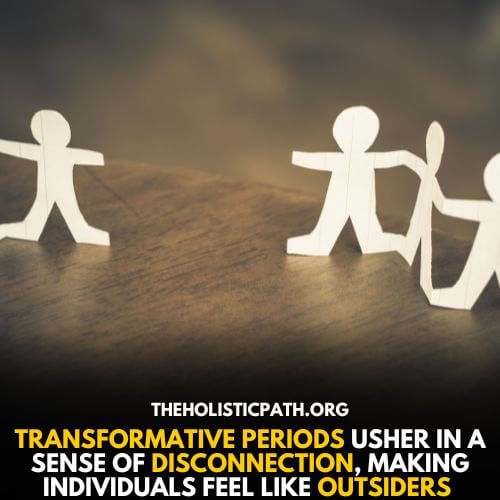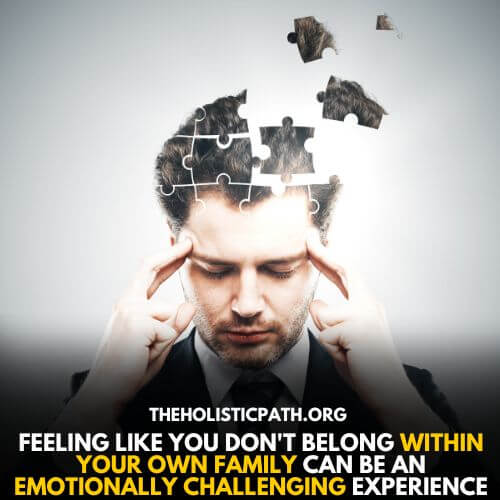Amidst the complexities of life and the constant search for identity, the feeling of not quite fitting in, of being an outsider in one’s own surroundings, is a sentiment that resonates deeply with many. The sensation of “I don’t belong to this era” or “I don’t belong” carries with it a profound weight, casting shadows on one’s sense of self and purpose.
This pervasive emotion, though often unspoken, touches the lives of individuals from diverse backgrounds, traversing cultures, and transcending boundaries. In this exploration, we delve into the intricate web of experiences and emotions that stem from this profound declaration, examining its impact on the human psyche, relationships, and the broader tapestry of society.
Why Don’t I Feel a Sense of Belonging? 8 Possible Reasons
The feeling of not belonging, or the question “Why don’t I feel a sense of belonging?” is a complex and deeply personal experience that can be influenced by a variety of factors. Understanding this sentiment involves delving into the intricacies of one’s emotions, life circumstances, and psychological processes. Here are some key factors that can contribute to a lack of a sense of belonging:
1. Personal Identity and Self-Concept
Personal identity and self-concept are the core building blocks of how we perceive ourselves within the tapestry of society. When individuals grapple with issues related to their self-esteem, self-worth, or self-acceptance, it becomes an uphill battle to establish a genuine sense of belonging.
These internal struggles, such as doubting one’s abilities or constantly questioning their worth, can sow the seeds of an enduring feeling of not quite fitting in or perpetually being on the fringe in various social scenarios. Imagine, for instance, someone who constantly doubts their own abilities at work; this self-doubt might lead them to feel like they don’t truly belong among their colleagues, impacting their overall sense of belonging in the workplace.
2. Social Isolation
Social isolation isn’t merely a state of being physically alone; it’s a potent emotional and psychological experience. Humans, by nature, are social creatures, wired to connect with others. When individuals lack those meaningful social bonds and connections, it’s akin to navigating a vast, empty sea of loneliness and disconnection.
Imagine being in a crowded room, surrounded by people, but feeling utterly alone because you lack those genuine connections. This absence of a support network or the feeling of belonging to a tight-knit group or community can lead to an overwhelming sense of isolation, a profound emotional void that gnaws at one’s well-being and amplifies the yearning for a place to belong.
3. Cultural and Ethnic Differences:
Cultural and ethnic differences can significantly impact an individual’s sense of belonging, particularly for those who identify with minority groups. The intricate interplay of cultural backgrounds can be both a source of richness and a challenge. Discrimination, prejudice, or even the subtle sense of being different from the dominant culture can create profound feelings of exclusion and isolation.
This often complex and emotionally charged landscape is shaped not only by personal experiences but also by broader societal factors, such as institutional discrimination and historical inequalities. These disparities in treatment and opportunities can deepen the sense of not belonging, making it a persistent, and at times, painful aspect of an individual’s life.
4. Life Transitions:
Major life transitions, such as relocating to a new city, embarking on a career change, or entering a new phase of life, can disrupt an individual’s sense of belonging. These transformative periods usher in a sense of disconnection, often making individuals feel like outsiders in their new circumstances.
The process of establishing new connections and a sense of familiarity in an unfamiliar environment demands both time and effort.
During this transitional journey, it’s entirely common to experience temporary bouts of not belonging, as individuals work to weave themselves into the fabric of their new reality. These moments of uncertainty can be particularly challenging as they signify a departure from the comfort of the familiar into the uncharted territory of change, emphasizing the importance of adaptability and resilience in the quest for belonging.

5. Experiences of Rejection:
The scars of past rejections and exclusions can cast long shadows on an individual’s sense of belonging, echoing through childhood, adolescence, or even into adulthood. These formative experiences, etched in memory, can instill a deep-seated fear of repeating past pain.
This fear of being rejected again can give rise to a persistent feeling of not fitting in, even in situations where acceptance is more likely. Imagine someone who faced rejection or bullying in their school years; these scars may continue to haunt them, making it challenging to believe they truly belong, even in welcoming social or community contexts.
Overcoming these emotional hurdles often involves a journey of healing and self-discovery, addressing the wounds of the past to pave the way for a more secure sense of belonging in the present and future.
6. Social Comparison
Social comparison is a widely recognized psychological phenomenon where individuals instinctively measure themselves against others. In today’s digital age, with the constant exposure to meticulously curated and often idealized depictions of other people’s lives on social media, this tendency has taken center stage. The ceaseless scrolling through polished snapshots of others’ accomplishments and seemingly perfect lifestyles can sow the seeds of deep-seated inadequacy and isolation.
When individuals perceive themselves as falling short of the societal standards or the seemingly faultless lives of their peer groups, these feelings can intensify, further deepening their sense of not belonging. It’s as if a relentless stream of glossy highlight reels magnifies any perceived shortcomings, amplifying the dissonance between one’s self-perception and the curated images of others.
7. Mental Health Issues:
Mental health conditions, such as depression, social anxiety, or generalized anxiety disorder, wield a substantial influence over one’s sense of belonging. These conditions often bring with them distorted thinking patterns that can make individuals feel like they don’t deserve connections or that they’re under constant scrutiny by others.
Imagine someone dealing with depression; it might convince them that they are a burden to those around them, making them reluctant to seek or accept support from friends and family. Similarly, social anxiety can create an overwhelming fear of judgment or humiliation in social situations, causing individuals to withdraw and struggle to connect with others. These mental health challenges can cast a long shadow on an individual’s sense of belonging, making it vital to address both the underlying condition and the feelings of isolation that often accompany them.
8. Lack of Shared Interests or Values
Feeling a sense of belonging often hinges on the presence of shared interests, values, or beliefs within a social group. When an individual finds themselves in environments where they do not have common ground with others, it can lead to a palpable sense of disconnection. Think of it as being in a room full of people passionately discussing a topic you have no knowledge of or interest in; you might feel like an outsider, struggling to find your place in the conversation.
Similarly, if one’s core values and beliefs differ significantly from those of their social circle, it can create a sense of alienation. In essence, shared interests and values act as the glue that binds individuals together, making them feel like they belong to a particular group or community.
7 Reasons For Feeling I Don’t Belong to This Era
Feeling like you don’t belong to this era, especially in today’s fast-paced 21st century, can be a deeply personal and sometimes isolating experience. It’s as if you’re living in a world that, in many ways, doesn’t align with your core values, preferences, or sensibilities. Several factors can contribute to this sentiment of alienation:
-
Technological Overwhelm: The rapid advancement of technology in the 21st century can be overwhelming, especially for those who grew up in an era with simpler, less connected lifestyles. The constant inundation of smartphones, social media, and the digital world can make you feel disconnected from the simplicity of the past. The sense of nostalgia for a time when life moved at a slower pace and people weren’t constantly tethered to screens can intensify this feeling.
-
Cultural Shifts: Cultural norms and values have evolved significantly in recent decades. The emphasis on instant gratification, consumerism, and the pursuit of fame or material success can clash with more traditional or timeless values like patience, simplicity, and community. If you resonate more with these traditional values, you may feel out of sync with the prevailing cultural zeitgeist.
-
Social Isolation: The paradox of our hyper-connected world is that it can sometimes lead to feelings of social isolation. Online interactions may not provide the depth and authenticity of face-to-face connections, leaving you longing for genuine, meaningful relationships in an era characterized by virtual communication and fleeting connections.
-
Environmental Concerns: Growing concerns about environmental degradation, climate change, and resource depletion can add to the sense of not belonging to this era. Witnessing the world’s challenges and the sometimes inadequate response from society can make you feel like an outlier in a world that doesn’t prioritize sustainability and responsible stewardship of the planet.
-
Political and Social Divisions: The 21st century has seen significant political and social divisions in many parts of the world. If you identify with a set of beliefs or values that are at odds with the prevailing ideologies, you may feel like a misfit or outsider, further deepening your sense of not belonging.
-
Media and Pop Culture: Pop culture and media representations can often glorify certain lifestyles or ideals that don’t resonate with everyone. If you find it challenging to connect with or relate to the media’s portrayal of success, beauty, or happiness, you might feel like an alien in a world where these ideals are highly promoted.
-
Historical Perspective: Some individuals may feel a strong connection to the past or a longing for a bygone era, believing that the values, aesthetics, or simplicity of that time were more aligned with their own. This historical perspective can create a sense of detachment from the present.
It’s important to recognize that feeling like you don’t belong to this era is a valid and personal experience. Many people grapple with similar feelings of disconnection, and it’s essential to seek support and connection with like-minded individuals who share your values and interests. Additionally, embracing the unique perspectives and insights you bring to the contemporary world can be a way to find your place and purpose in this ever-changing era.
I Feel Like I Don’t Belong in My Family
Feeling like you don’t belong within your own family can be an emotionally challenging experience. It often stems from a sense of disconnection, whether it’s due to differences in values, interests, or personalities. One common factor contributing to this feeling is a lack of shared experiences or a perceived inability to relate to family members. It can be especially pronounced during adolescence when individuals are forming their own identities and may find themselves at odds with their family’s expectations or beliefs.

Sometimes, this sense of not belonging can be exacerbated by unresolved conflicts or strained relationships within the family.
These conflicts can create a hostile or unwelcoming environment that makes it difficult to feel like you truly fit in. In such cases, the feeling of not belonging can be particularly distressing, as it can lead to a deep yearning for acceptance and understanding within one’s own kin.
However, it’s important to remember that feelings of not belonging within a family are not uncommon, and they can change over time. Open and honest communication, along with efforts to find common ground and shared experiences, can help bridge the gap and foster a stronger sense of belonging.
Additionally, seeking support from friends, mentors, or therapists can provide valuable perspectives and coping strategies for navigating these complex family dynamics. Ultimately, the journey towards feeling like you belong within your family often involves self-discovery, patience, and a willingness to engage in constructive dialogue and healing processes.
8 To Do When You Feel Like You Dont Belong
When you find yourself grappling with the unsettling feeling of not belonging, it’s essential to remember that you are not alone in experiencing this emotion. It’s a common human experience, and there are constructive steps you can take to navigate it. By acknowledging and addressing these emotions, you can work towards a stronger sense of connection and belonging in your life.
1. Self-Reflection and Acceptance:
When confronted with the disconcerting feeling of not belonging, embarking on a journey of self-reflection is the first crucial step. Allocate time to delve deep into your emotions, thoughts, and personal experiences. Understand that these feelings are valid and normal human responses to certain situations or circumstances.
It’s paramount during this process to extend compassion towards yourself and resist self-criticism. Acceptance of your emotions as a part of your current experience is fundamental; they don’t define your entire identity. By acknowledging and respecting your feelings, you lay the foundation for further growth and healing.
2. Identify the Source:
To effectively address the issue, it’s essential to dig deeper and identify the source or sources of your feelings of not belonging. This requires a thorough examination of your life experiences, including personal insecurities, past traumas, or specific environmental and social factors that might be triggering these emotions.
Understanding the roots of your feelings can empower you to develop a targeted approach for addressing the issue. For instance, if the feeling of not belonging is linked to past traumatic experiences, recognizing this connection can guide you towards trauma-informed therapies and coping strategies.
3. Seek Support and Connection:
Confronting feelings of not belonging can be a challenging and emotional process. It’s often immensely helpful to seek support and connection from others during this journey. Reach out to friends, family members, or trusted individuals in your life who can provide emotional support and a listening ear.
Sharing your feelings with someone you trust can be incredibly cathartic and frequently leads to a sense of relief. Social support can provide validation, empathy, and different perspectives that help you navigate your emotions and begin the process of healing.
4. Expand Your Social Circles:
Sometimes, feelings of not belonging are exacerbated by limited social circles or a lack of diverse experiences. Consider broadening your social horizons by actively participating in clubs, groups, or communities that align with your interests and values.
Engaging in activities you are passionate about can serve as a catalyst for connecting with like-minded individuals who share your enthusiasm. This shared interest can create a sense of belonging that stems from a shared purpose, ultimately fostering a greater sense of connection and belonging in your life.
5. Cultivate Self-Confidence:
The journey toward overcoming feelings of not belonging often necessitates the cultivation of self-confidence and self-esteem. Engaging in self-care practices, setting achievable goals, and celebrating your accomplishments, no matter how small they may seem, are essential steps in this process.
Building a strong sense of self-worth can act as a protective shield, mitigating the impact of external factors that contribute to your feelings of not belonging. Confidence in your abilities and a positive self-image can help counter negative self-perceptions and boost your overall sense of belonging.
6. Professional Help:
If your feelings of not belonging persist and significantly impact your well-being, seeking professional help from a therapist or counselor can be invaluable. These trained professionals can provide a safe and supportive environment for you to explore the root causes of your emotions.
They can also equip you with evidence-based strategies and coping mechanisms to address and overcome these feelings. Therapy can be a transformative process, allowing you to gain deeper insight into your emotions and providing you with the tools to navigate them effectively.

7. Embrace Individuality:
It’s important to remember that everyone is unique, and differences are what make the world diverse and interesting. Embrace your individuality and recognize that it’s perfectly acceptable to be different from others. Celebrate your strengths and the qualities that make you stand out.
By doing so, you can foster a profound sense of pride in your uniqueness, ultimately diminishing the impact of feeling like you don’t belong. Self-acceptance and the celebration of your individuality are powerful tools for boosting self-esteem and building a stronger sense of belonging.
8. Give It Time:
Overcoming feelings of not belonging is a process that often unfolds gradually. Be patient with yourself and acknowledge that change takes time. Celebrate small victories along the way and remain committed to your journey of self-discovery and connection.
With persistence, effort, and a willingness to engage in personal growth, you can cultivate a deeper and more authentic sense of belonging in your life. Remember that this journey is about self-acceptance, growth, and building connections that resonate with your authentic self.
You feel that you were born at the wrong time. You’re too idealistic, you’re too romantic. You believe in things that no one else does anymore. Things like love, friendship, and honesty.
Those things don’t exist anymore, at least not like they used to. People are too busy and too caught up in their own lives to care about anyone else. It’s all about me, me, me. And you just don’t fit in.
But you know what? That’s okay. That’s more than okay, it’s actually amazing. Because you’re different, you’re special. You see the world through rose-colored glasses and you make it a better place just by being you.
So don’t ever change, don’t ever conform. You belong to a different era, a better era, and the world needs more people like you.
